Croatian Post Logistics Centre Worth 60 Million Kuna Opening Soon
March the 7th, 2022 - A brand new Croatian Post logistics centre worth 60 million kuna is set to open its doors very soon, spanning a total area of 5,000 square metres and boasting its very own solar power plant.
As Novac/Jutarnji/Jozo Vrdoljak writes, on Friday, March the 11th, the new Croatian Post logistics centre will open in the Kukuljanovo industrial zone. The new Bakar-Kukuljanovo business facility, worth a massive 60 million kuna, will have a total area covering almost 5,000 square metres as well as its own solar power plant. More than 300 employees of Croatian Post will work at that location. This investment, with which Croatian Post will complete all of its round of investments in infrastructure, created the proper preconditions for further logistical growth and development of the company itself, but also laid a good foundation for the development of the entire Croatian logistics market.
''The location of the new facility is crucial for raising the level of quality and all logistics work, and the new Croatian Post business facility will be located in a place with very good traffic connections. The facility is close to the Rijeka - Zagreb motorway and the Kvarner road, and the centre of Rijeka is only 10 kilometres away. The Kukuljanovo business facility, which will centralise operations with as many as five locations, is an important link in raising the quality and speed of providing services to all residents who gravitate to this area. This is a link for the raising of the quality and speed of providing services to all residents who gravitate to this area - Gorski kotar, Istria and Kvarner,'' stated Ivan Culo, the president of Croatian Post.
A five-year investment cycle
Over the past five years, Croatian Post has conducted an investment cycle amount to almost one billion kuna in total. In addition to investments in digitalisation, significant funds have been invested in expanding their existing facilities and building new logistics capacities. In addition to investing in Kukuljanovo, their logistics space in Osijek was expanded, a new logistics centre was built in Zadar, capacities were expanded in Bjelovar and a new sorting centre was built in Velika Gorica near Zagreb, which is the largest capital investment in Croatian Post's entire history. The new sorting centre was opened back in 2021 and is the largest capital investment in the history of Croatian Post, worth an enormous 350 million kuna.
''Infrastructural investments in the network of our sorting plants will have a favourable effect on the overall development of the logistics market across Croatia. All of the locations of modern sorting plants are strategically selected and are located in areas that are well connected in terms of traffic and are in line with logistics trends. Previously, such facilities were located in the centres of large cities, and today they're placed on the outskirts along important traffic routes. The number of locations where the operational part of the shipment business, such as sorting and processing, is performed has now decreased. In Zagreb, business with four locations was moved to the new sorting centre, while in Kukuljanovo the business with five locations is centralised,'' explained Culo, noting that the logistics sector had to find a solution to the e-commerce explosion in a short time and radically change established ways of meeting the varying needs of both private and business users.
''It's enough to look at record traffic, as well as at delays in ports all over the world, which are part of the wider crisis of global supply chains. Solutions exist, but they aren't cheap or quick. Smart investments are proving to be the key to success, as the rapid growth of e-commerce and package business, as one of the consequences of the pandemic, has shown just how important investments in technology and infrastructure truly are. Fortunately, we don't have to look for good examples outside of Croatian borders, because this one state-owned company in the coronavirus pandemic showed how to transform business operations in the short term and adapt to the new normal,'' explained Culo.
Culo also made sure to emphasise that Croatian Post, with this, its largest investment cycle in history, started several years before the outbreak of the coronavirus pandemic.
''Experience has shown that companies that were in the upward trajectory of their investment cycle were ready for the challenges presented by the pandemic, and there are many examples of companies that have further strengthened during the crisis. For years, modern logistics companies have been relocating their capacities from urban centres to locations close to well-connected cities. Such is the case with this new Croatian Post logistics centre, but it isn't the only modern sorting plant owned by us. Users will feel the results of that investment through an even better service and a guarantee that their turn towards e-commerce will be successfully monitored by the company. A large number of packages arriving every day is nothing new to operational workers, and everything that arrives at the sorting plant continues on the same day towards its final destination,'' said Culo, adding that with the growth of the package business, reverse logistics is becoming more and more important.
For more, check out our business section.
How Much Will Croatian Electricity Prices Rise After April 1, 2022?
March the 7th, 2022 - With Croatian inflation measures set to come into force on the first of next month, just how much will Croatian electricity prices rise after that date?
As Poslovni Dnevnik writes, Hrvatska elektroprivreda (HEP) has announced its new Croatian electricity prices, which will be in force from April the 1st, and it seems that electricity will still be more expensive for some consumers than what Prime Minister Plenkovic announced it would be back in mid-February.
Back in mid-February, the Croatian Government adopted a package of measures to try to put a cap on soaring energy prices, according to which VAT on electricity will remain at 13 percent, and Prime Minister Plenkovic announced that electricity prices for households should increase by up to 9.6 percent. Without the introduction of these government measures, the growth of prices for households across the country would stand at 23 percent, all because the price of electricity on stock exchanges has quadrupled in just one year, writes Energetika-net.
However, the published price lists from HEP suggest that the price increase for most people who have dual-tariff metres in their homes will be higher than expected, at least according to their current calculations.
"The 9.6 percent increase in Croatian electricity prices was probably used in the presentation as a represenation of a mix of different types of consumers, but it doesn't apply to all consumers in the ''household'' category. When the tariff items published by HEP Elektra (universal service) and HERA are applied, households will receive bills which are 8 percent higher from this supplier as of the 1st of April for one tariff metres, while two-tariff metres (TM white) will receive bills which are higher by 11 percent.
When it comes to the question of whether or not Croatian electricity prices for end users will actually increase even more, it all depends on HEP's decision, ie whether they will start collecting a solidarity fee, which they haven't been collecting so far. In that case, the bills for one tariff metres (blue) would grow by 11 percent, and for two-tariff metres (white), by 14 percent. As for HEP Supply (HEPI), the average growth will be 14 percent, and if the solidarity fee does indeed start being collected, then growth will rise to 17 percent. These calculations include VAT,'' explained Nenad Kurtovic from the Split Consumer Association.
When asked by Novi list about their new tariffs, HEP replied that the amount of change in the cost of electricity will all depend on the tariff model and of course on the overall consumption of each individual customer.
"As announced in the presentation of the package of inflation measures to mitigate the growth of energy prices by the Croatian Government, the average electricity bill will increase by 9.6 percent. The amount of the change in cost in each individual case will depend on the tariff model and the amount of electricity consumed, as well as on the ratio of consumption in the higher and lower tariffs,'' HEP replied.
For more, make sure to check out our lifestyle section.
KK Krka Uses Home-Court Advantage to Win ABA League Relegation Fight against Split 87:84 (46:49)
March 6, 2022 - A good first half by KK Split was not enough to bring back important points from KK Krka in Slovenia.
Both teams at Leona Štuklja Sports Hall in Novo Mesto knew how important the match was for their respective future in ABA League 1. Merely 3 wins from 18 games for the hosts and 3 wins from 19 games for the “Yellows” from Split meant the worst two teams in the league were going head to head.
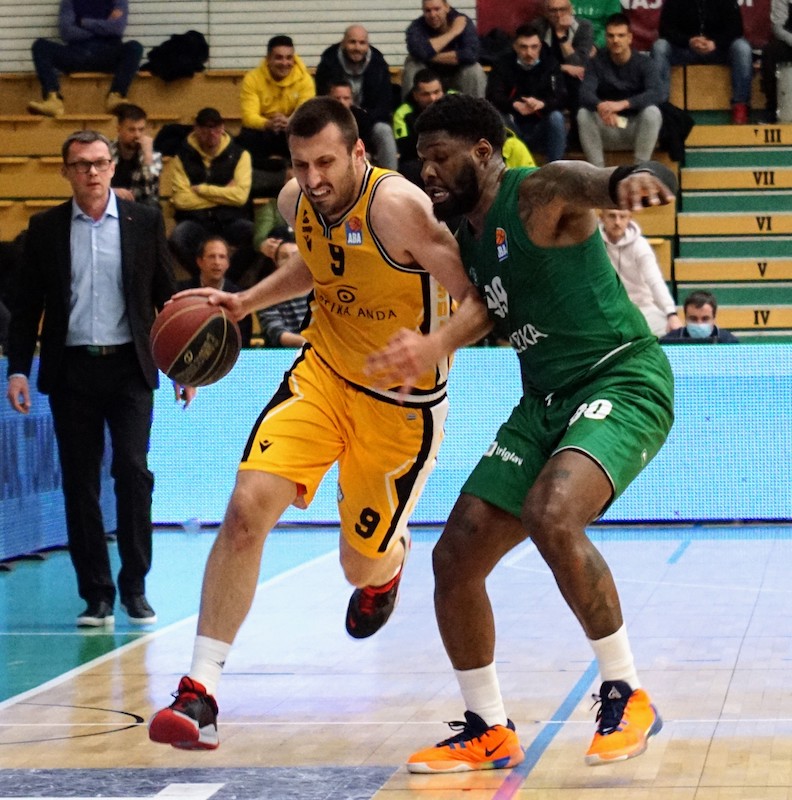
Mornar, Zadar, and Borac, with seven victories, already seem out of reach, and the loser would very likely have to go down into the second league while the winner would at least keep hopes alive to play relegation against the runner-up in ABA League 2.
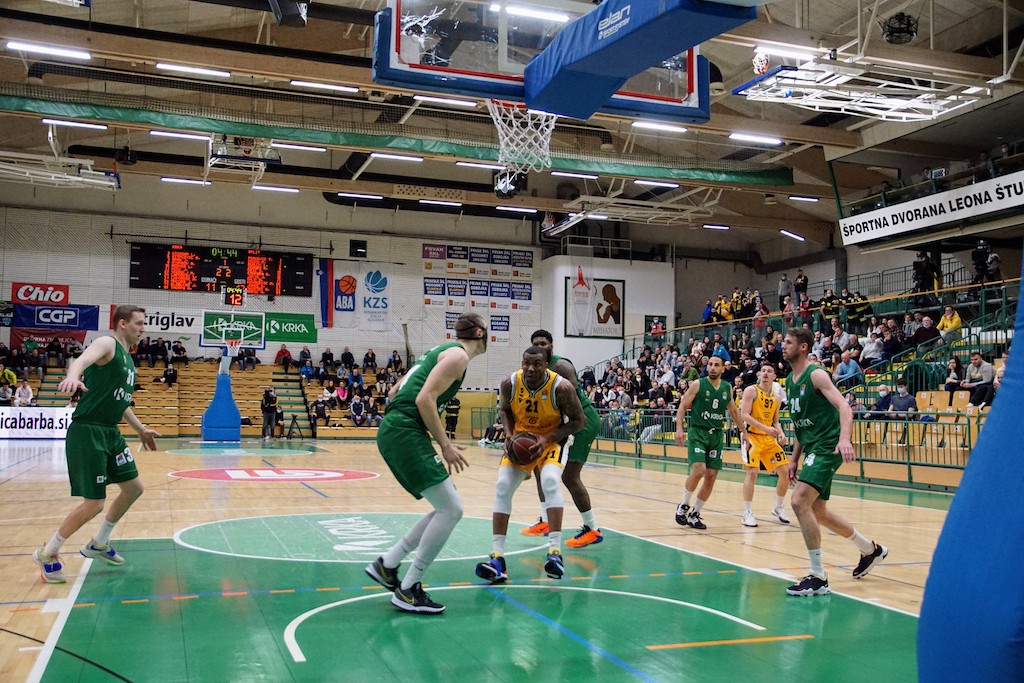
Krka coach Dalibor Damjanović tried to have his team prepared against many threats from Shannon Shorter and several of his teammates while Srđan Subotić, coach of Split, tried to have his team forget the surprising home game loss against KK Alkar on Friday. Instead, both coaches had their teams start the game focused.
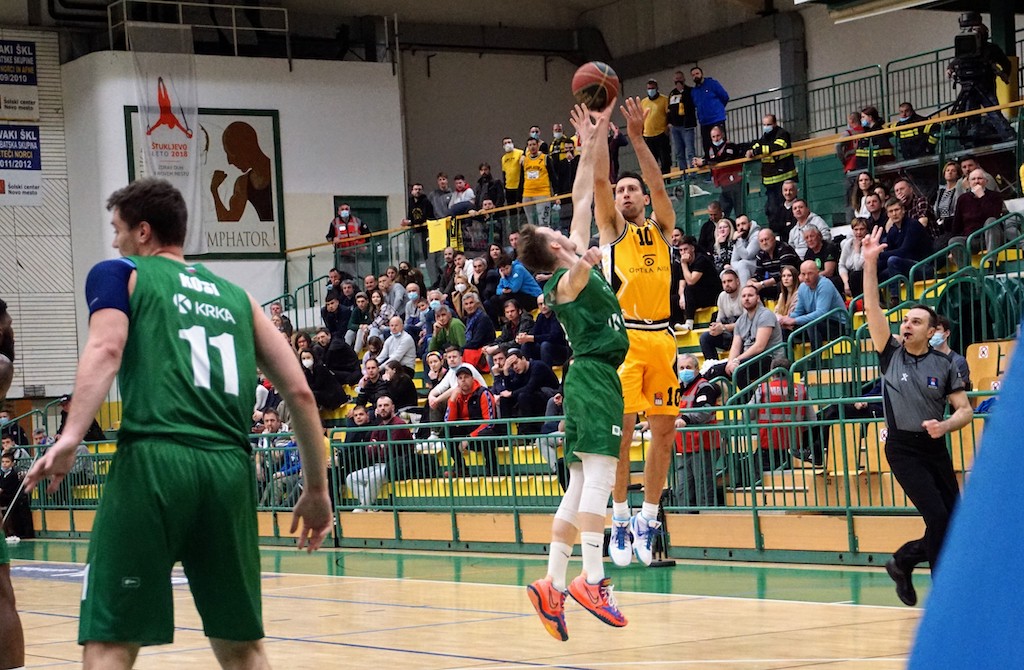
The 250 guests who came to watch the game at an unusual time saw a good first half with few mistakes on both sides. The match was very balanced in the first half, with plenty of lead changes. Nevertheless, the guests from Split managed to take a slight lead into the locker room at half-time (46:49).
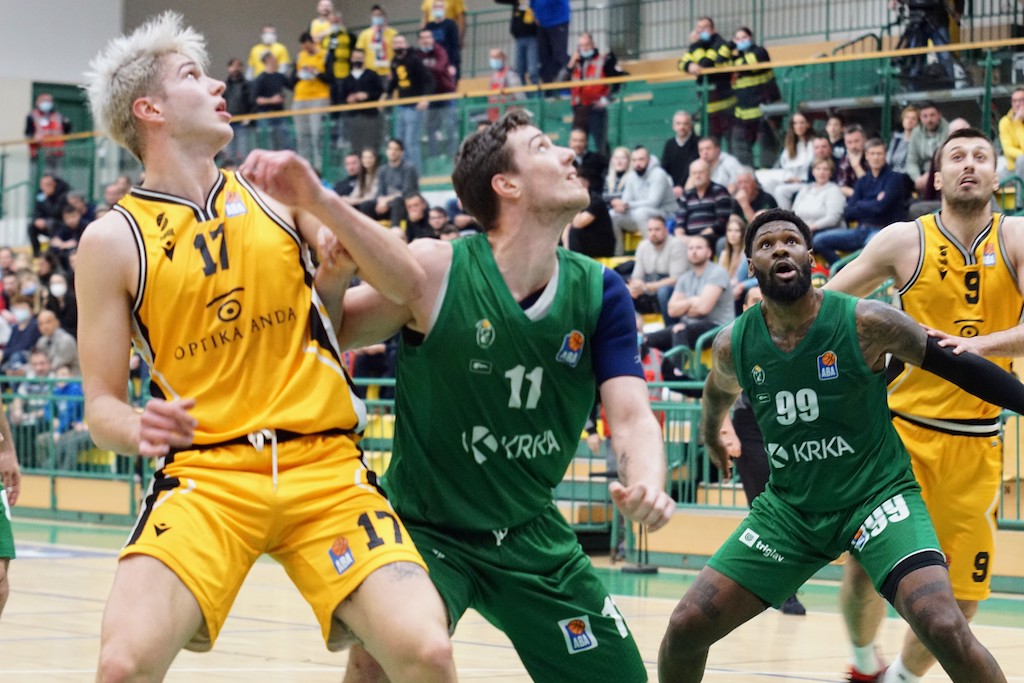
Krka all-around player Adonis Thomas who had been injured during the game in Split, showed his importance in the second half. The team from Novo Mesto returned wide awake from the break and laid the foundation for the win with a 23:11 scoring run in the third quarter. While the “Yellows” came back into the game in the fourth quarter, the energy seemed drained after the game on Friday and traveling on Saturday.
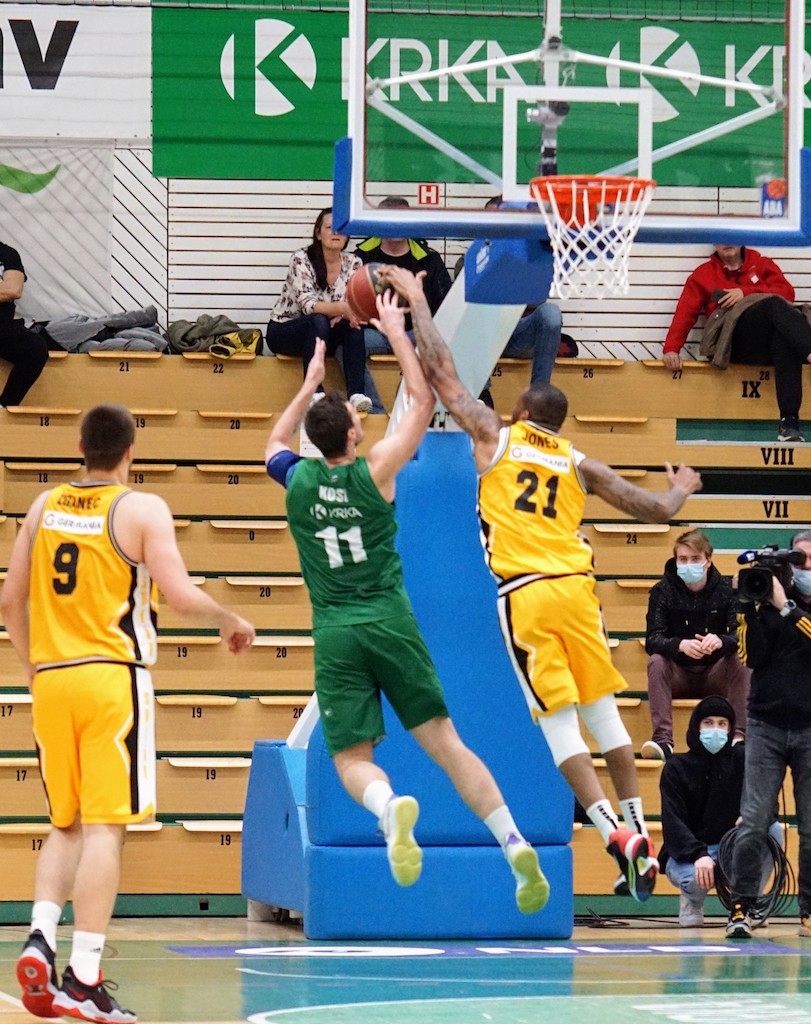
It could be just bad luck for Split that after 12 straight losses, it was in game 13 that Krka could stop its losing streak, but then again, any team making only 12 of 21 free throws does not deserve to win at this level. Both teams still have a few opportunities to change their position in the table but despite still holding the advantage in direct comparison, Split missed a critical chance tonight.
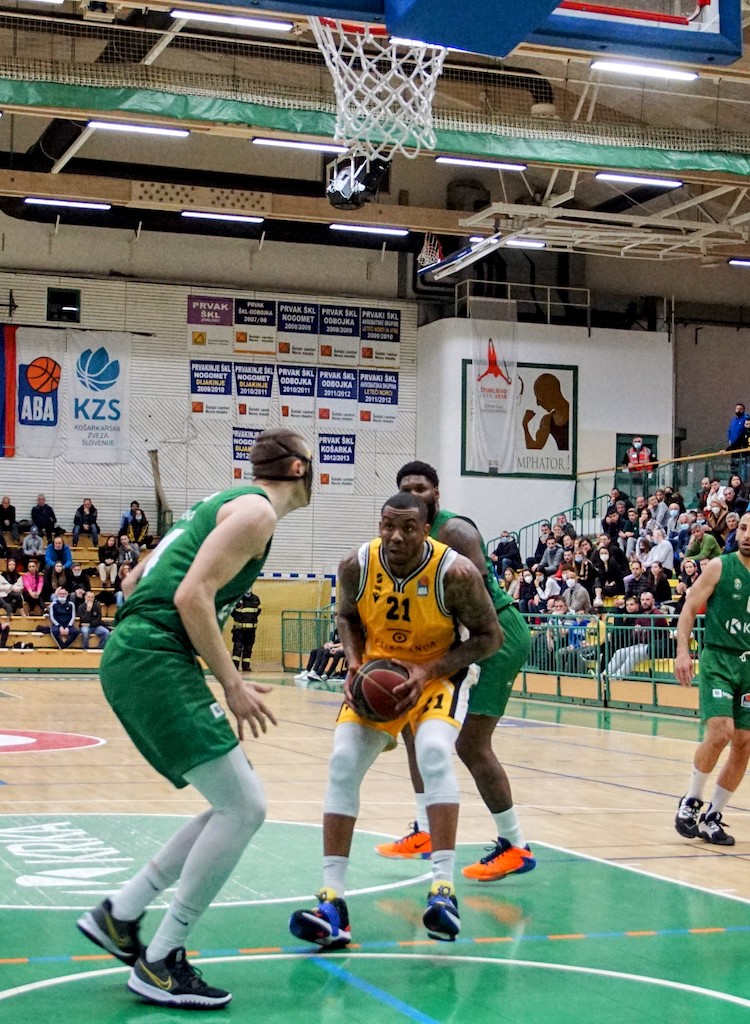
Apart from Thomas, who had eight rebounds and 23 points, Miha Lapornik shone brightly for the home team and dropped a total of 25 points to become the top scorer of the night. However, it was once again Shannon Shorter who scored most points for the guests sharing the spot with Toni Perkovic this time (both 18).
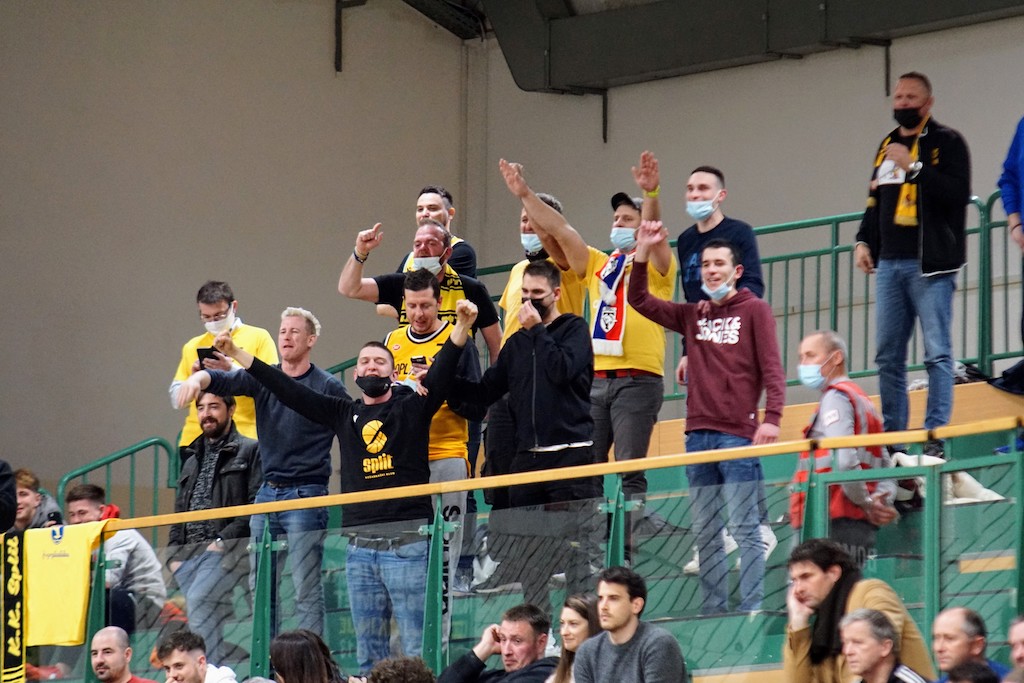
The “Yellows" will have a week to lick their wounds before they host Mornar at Gripe on Friday. Krka will play in the Slovenian league on Wednesday before traveling to Borac on Saturday.
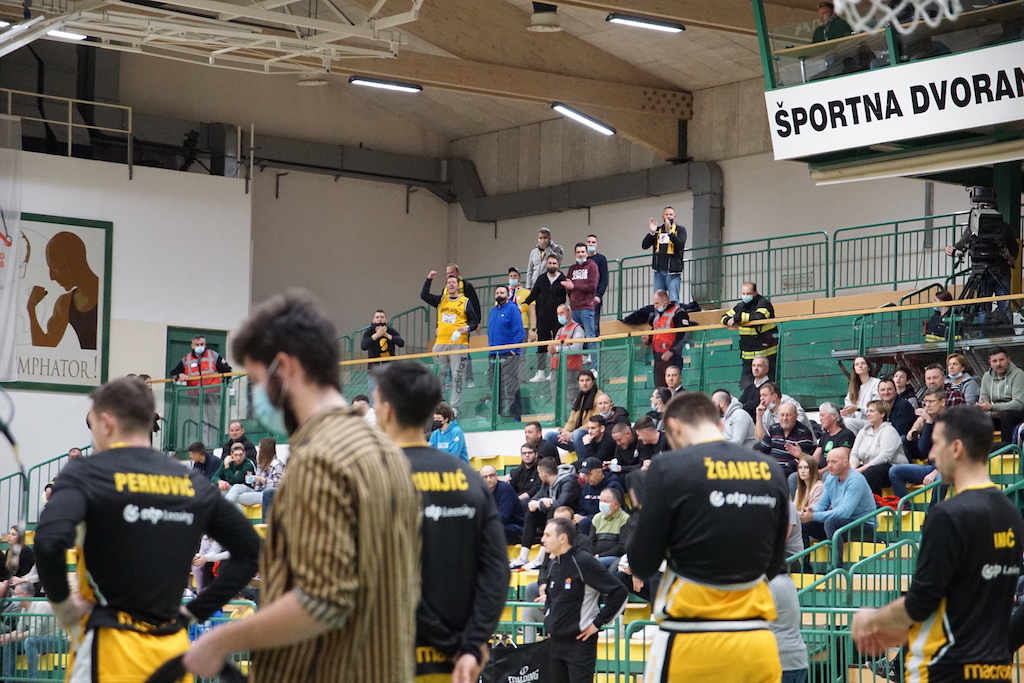
2022/03/06 ABA League KK Krka vs. KK Split
Venue: ŠD Leona Štuklja Novo Mesto
Referees: Ilija Belošević, Uroš Obrknežević, Vladimir Vesković
Results by quarter. 21:24,25:25,23:11,18:24
Box-Score: https://www.aba-liga.com/match/141/21/1/Boxscore/q1/1/home/krka-split/
To read more about sport in Croatia, follow TCN’s dedicated page.
Celebrate Women's Day With These Documentaries About Remarkable Artists
March 6th, 2022 - In honour of the upcoming Women’s Day, the Restart Label put together a documentary programme inspired by fierce female artists
The programme features documentary films dedicated to the famous writer Sylvia Plath and photographer Lee Miller. The films were first screened at the Dokukino KIC in Zagreb earlier this week, and are now heading to several other cities in Croatia - look for the list at the end of the article.
Sylvia Plath: Inside the Bell Jar (2018)
I write only because. There is a voice within me. That will not be still. This is how Slyvia Plath described herself and her urge to write when she was 15 years old. The very same voice will have its tragic end in 1963, when the young writer took her own life shortly after she published her seminal novel The Bell Jar.
Directed by Teresa Grifftihs, the film is the first to unravel the story behind the novel that shattered myths about women and shone a light on 1950s gender politics, sexual identity and mental health at a time when women struggled to find their voice. Narrated by Maggie Gyllenhaal, the film takes us through interpretations that followed, featuring unpublished letters and unseen photographs, as well as a conversation with Sylvia Plath’s daughter Frieda Hughes, in this touching portrait of the talented artist.
Capturing Lee Miller (2020)
Vogue model, artist’s muse, fearless war photographer: Lee Miller had many lives. Featuring images of Lee and by Lee, the BBC documentary explores this pioneering female artist who broke taboos and defied expectations.
Miller started her career as a model and was featured on the cover of Vogue US. Dubbed ‘one of the most photographed girls in Manhattan’, she soon realised she’d rather be the one behind the camera.
She took portraits, created surrealist compositions, and invented the photographic technique of solarization together with Man Ray. Miller was the only female war photographer in Europe during WWII - she captured the German bombing of London, the Normandy landings, and the concentration camps Buchenwald and Dachau.
The photo of Miller in a bathtub in Hitler’s apartment, taken by David Scherman in 1945, is one of the most iconic images of her time.
Interested? Here's a list of cities and venues that will host the two docs:
Zagreb: Dokukino KIC
Osijek: Kinoklub (Urania)
Križevci: Klub kulture
Požega: City library
Rovinj: A. Gandusio theatre
Split: Kinoteka Zlatna vrata
Šibenik: Kuća umjetnosti Arsen
Rijeka: Art kino Croatia
Zabok: Zelena dvorana
Pakrac: City library
Koprivnica: Kino Velebit
Pula: Kino Valli
Schedules will be published on the venues' respective sites.
Croatian Video Game Industry Receives First State Incentives
March 6th, 2022 - All submitted projects were required to feature elements of artistic, educational or cultural significance
Following a public tender announced in 2021, the Croatian Audiovisual Centre (HAVC) recently came out with a list of video game development projects that will receive state incentives in a total amount of 595,000 kuna. It’s the first time that the Croatian video game industry is being subsidised by the state.
The tender featured two subcategories: twenty six submissions were received in the category of project development, while the game production subcategory saw twenty submitted projects. The HAVC selected a total of eight projects to co-finance this year, writes tportal.
Six winning projects were announced in the project development category: Vučedol (Andrija Zorić), Professor Balthasar (Aleksandar Gavrilović), Ancient Tales (Mirinda Paraman), The Flight of the Bumblebee (Marko Hrenović and Ivan Turković-Hrnjak), One on One, Boys and Girls (Frano Petruša) and Path of View (Vanja Čulek).
In the category of game production, the HAVC selected Go Home Annie (Mladen Bošnjak) and Kiddoland (Mateja Vedrina) to receive funding.
The tender concept was similar to that seen in the film industry, explained Andrej Kovačević, creative consultant for video games at the HAVC. Every audiovisual project starts with an idea, a script - that kicks off the project development stage - and goes on to the production and post-production stages.
This is applicable to the video game industry as well. Some companies applied for funding for game development, not in terms of actually producing the game, but the initial stage that involves drawing up a detailed design plan and potentially creating a demo. They’re given 12 months to complete this stage. The other group, which applied for incentives for game production, already has the first part completed and will receive funding to produce the game, with 24 months given to finish the project.
All submissions were required to feature elements of artistic, educational or cultural significance. According to Kovačević, some projects featured established video game concepts where the required cultural component seemed to have been slapped on as an afterthought, but since this was the first tender of its kind, it was to be expected.
‘It’s an unusual financing model, one which requires documentation that these people may not be used to. In the video game industry, it’s customary for the publisher or investor to fund the entire project, whereas we have a co-financing model here. This is why we held workshops for anyone interested before the tender was announced, where we taught them how to create a project, how to budget, and the whole time while the tender was open we had guidelines published on our web pages, along with examples of best practices, available to all potential applicants’, said Kovačević.
The criteria were clearly outlined in the tender, including the relevant experience required of applicants, especially game designers and producers. Kovačević said there were applicants whose ideas were good but not well defined, and it was apparent they simply lacked experience.
‘They all received feedback and will be able to apply to the next tender with a more elaborate plan. The budget for video games is to be increased to 1.5 million kuna this year, which will create opportunities for bigger projects as well’, said Kovačević.
Other European countries have already developed the practice of subsidising the video game industry, with the sector most commonly financed through state film institutes. Spain, Romania, Austria and Switzerland have established models for co-financing video game production, same as Scandinavian countries; Croatia is the first in the region to introduce the practice.
Asked about what makes a video game successful, Kovačević referred to his experience in the industry.
‘I’ve been working in video game development for almost 10 years, and our company has launched dozens of games on the global market. One reached 500,000 users, another reached 20 million. We pivoted a lot: we made console games, educational games, and we’re now exploring the field of blockchain games. Based on all that experience, if I had to sum up the formula for success in one sentence, I’d say you need to have a game that stands out. In any way possible. In terms of visuals, mechanics… The competition is fierce, thousands of games are launched every day. You need to stand out in some way, but also have a business model which is acceptable in this day and age’, he said.
Croatian Energy Sector 2021: An Overview
March 7th, 2022 - An overview of the Croatian Energy Sector 2021.
The energy sector is a hot topic these days, and it is not a coincidence since rising prices of electricity, natural gas, and crude oil determine the prices in the overall economy. Energy prices determine the production costs, transportation costs, electricity costs, heating costs among many others. There is a rising concern over the ecological impact of the energy sector as well as the geopolitical impact that has never been more relevant.
Taking into consideration the aforementioned effects, I will shortly go through the energy statistics for 2021 reported by DZS which will give a short description of the Croatian energy sector as it was in 2021.
ELECTRICITY
In 2021, Croatia had total net production of electricity at 14 686 GWh, which is an increase of 14% compared to 2020. Exports and imports amounted to 7505 and 11 342 GWh which leads to 18 359 GWh of electricity available for the inland market. Exports recorded the highest growth with a 28% increase compared to 2020. It should be noted that the imports also include electricity produced by the nuclear power plant Krško in Slovenia of which HEP (Croatian state-owned electricity group) holds 50%.
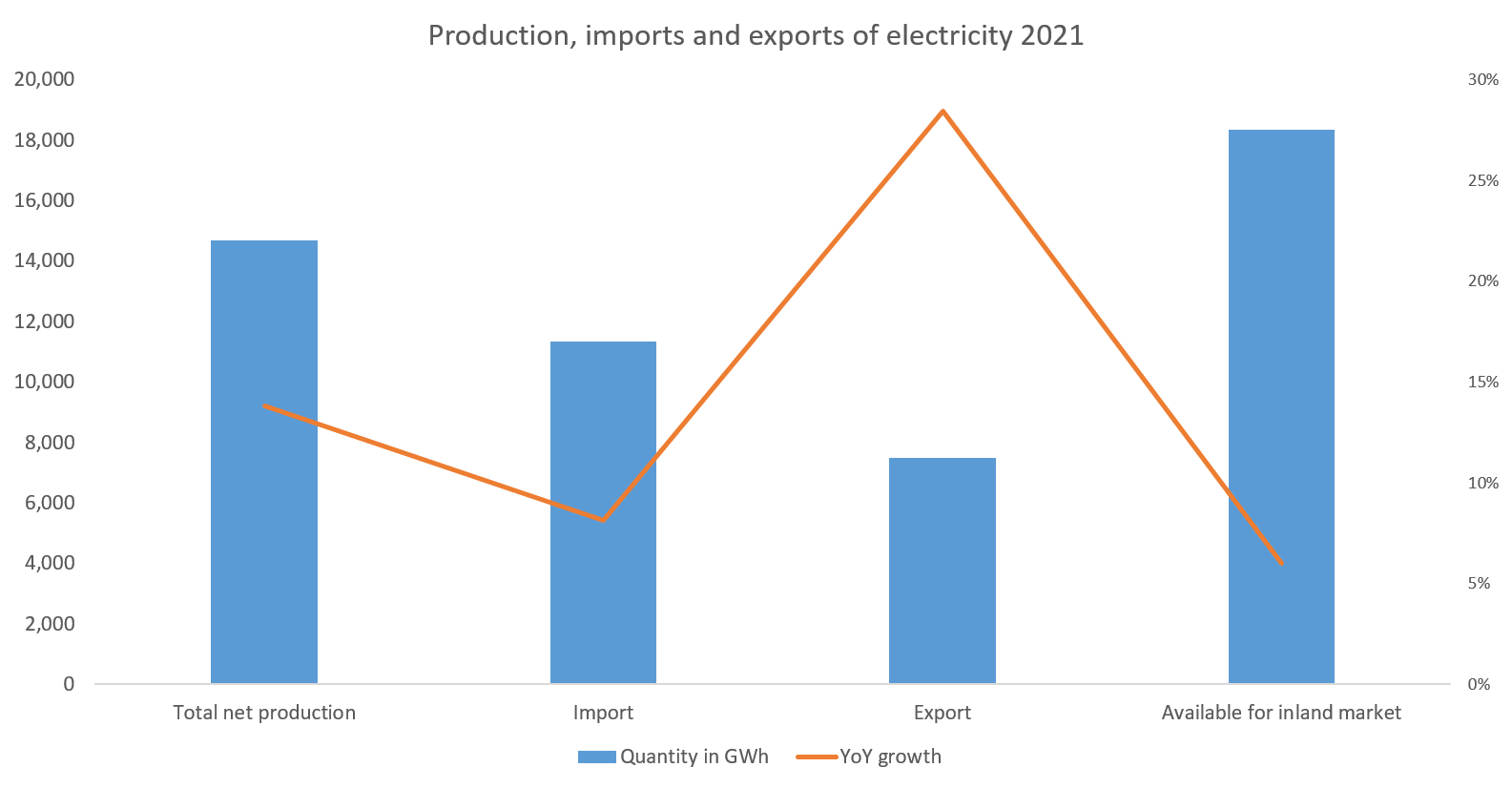
In 2021, 48.8% of the electricity produced in Croatia came from hydropower, 29.6% from thermal power plants and CHP on fossil fuels, 14% from wind power, and 6.5% from thermal power plants and CHP on renewable fuels. Solar power plants and geothermal power plants accounted for only 1%. Around 70% of Croatia's total net production comes from renewable resources.
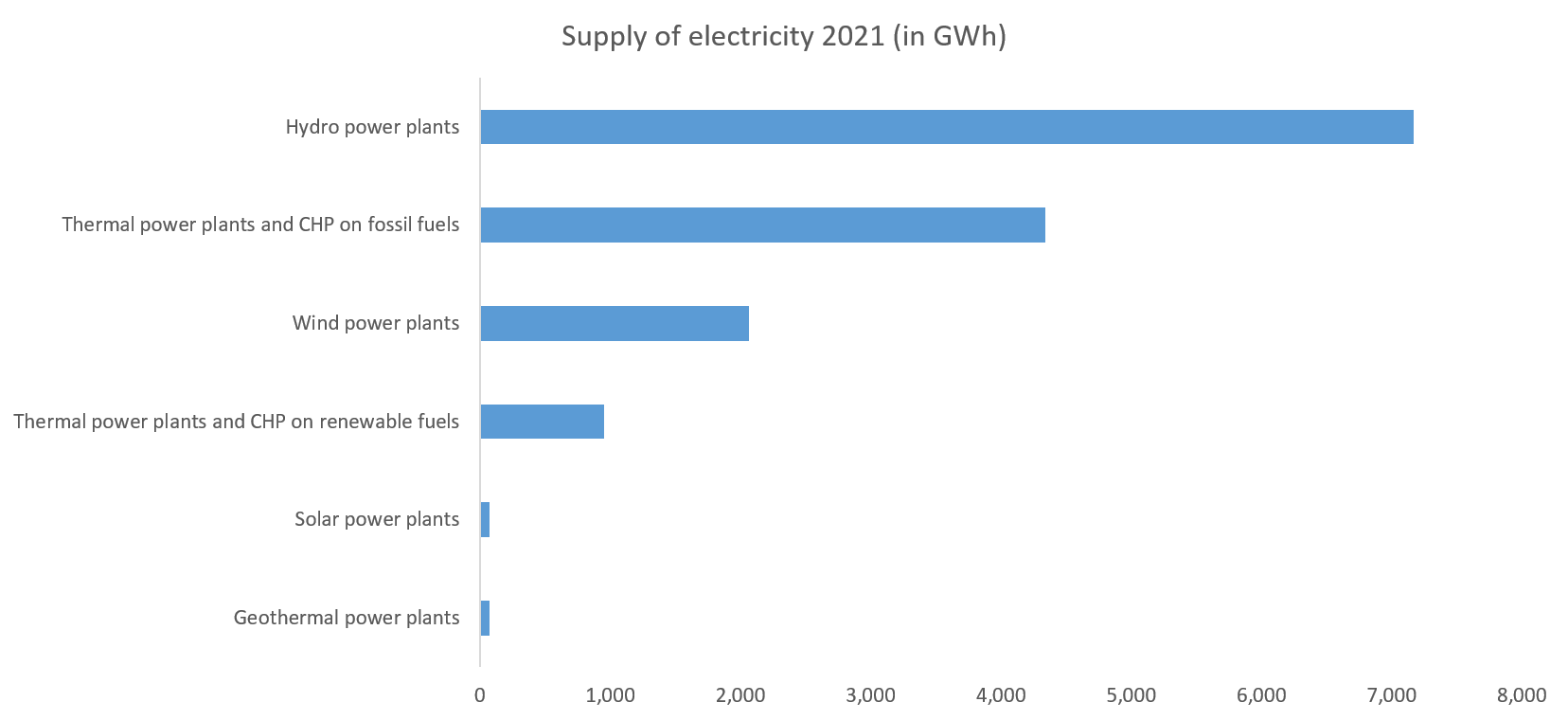
NATURAL GAS
In 2021, production of natural gas in Croatia amounted to 780 mln m3, which is a decrease of 12% compared to 2020. Imports amounted to 2240 mln m3 with an increase of 4%, while exports reached 76 mln m3. From natural gas that is available for the inland market, 76.5% comes from imports. Croatia is clearly a natural gas net importer with an export-to-import ratio of 0.03.
CRUDE OIL
In 2021, the production of crude oil in Croatia reached 558 thousand tonnes, a decrease of 4.6% compared to 2020. Imports were at 1767 and exports at 490 thousand tonnes. Both imports and exports were experiencing a year-on-year decrease with 9.2% and 22.5% each, respectively. Refinery input in 2021 was 1849 thousand tonnes which were also lower by 5.8%. Again, as with natural gas, Croatia is a crude oil net importer with an export-to-import ratio of 0.27.
PETROLEUM PRODUCTS
In 2021, 2461 thousand tonnes of petroleum products were produced in Croatia which is a decrease of 4.9% compared to 2020. Gas/Diesel oil had the biggest share with 45%, followed by motor gasoline with 24%.
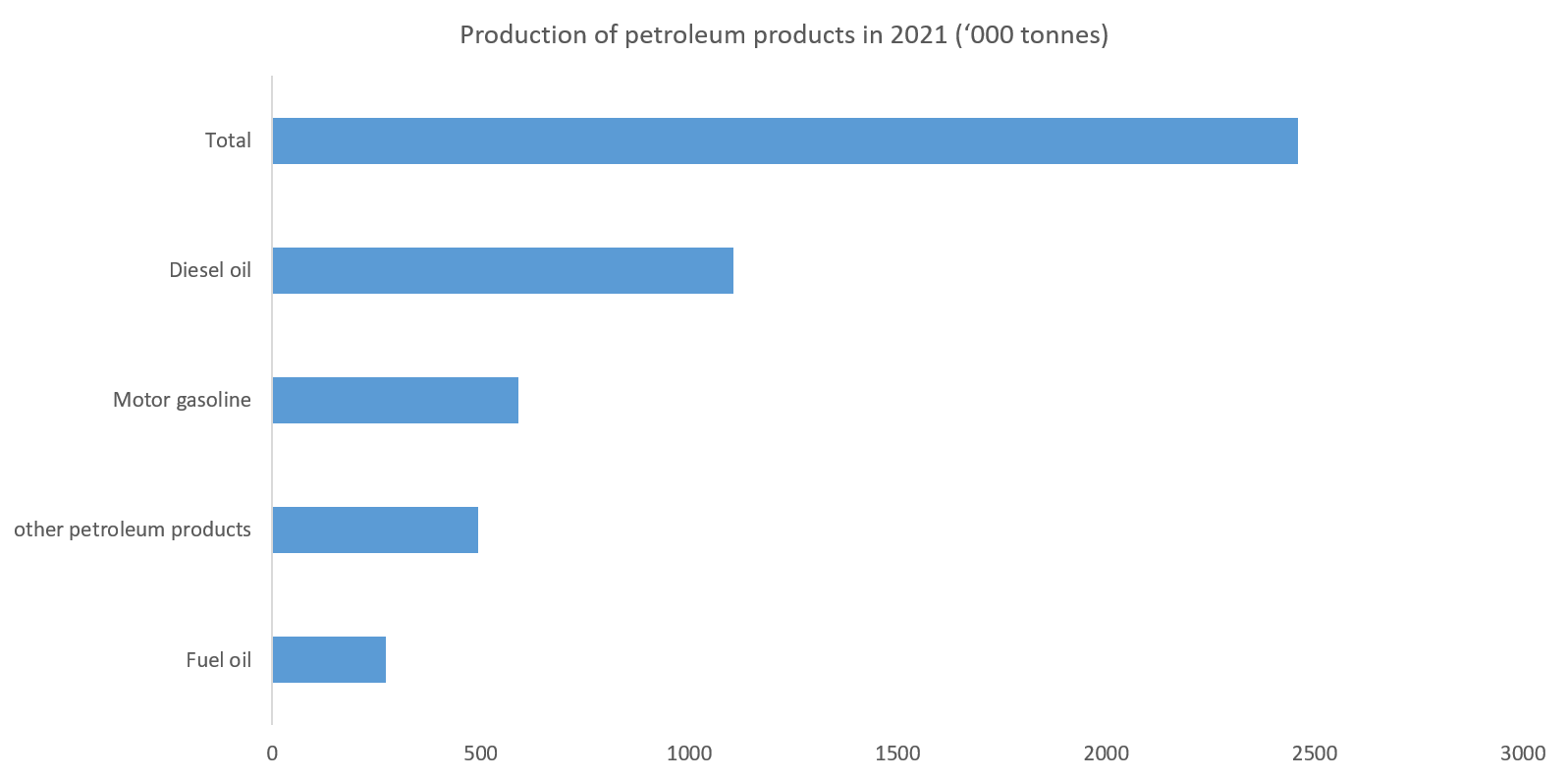
All observed categories of petroleum products experienced a decrease in the level of production, except for fuel oil which saw an increase of 5%. The same holds for imports and exports, all of the categories except fuel oil saw an increase in imports and decrease in exports compared to 2020.
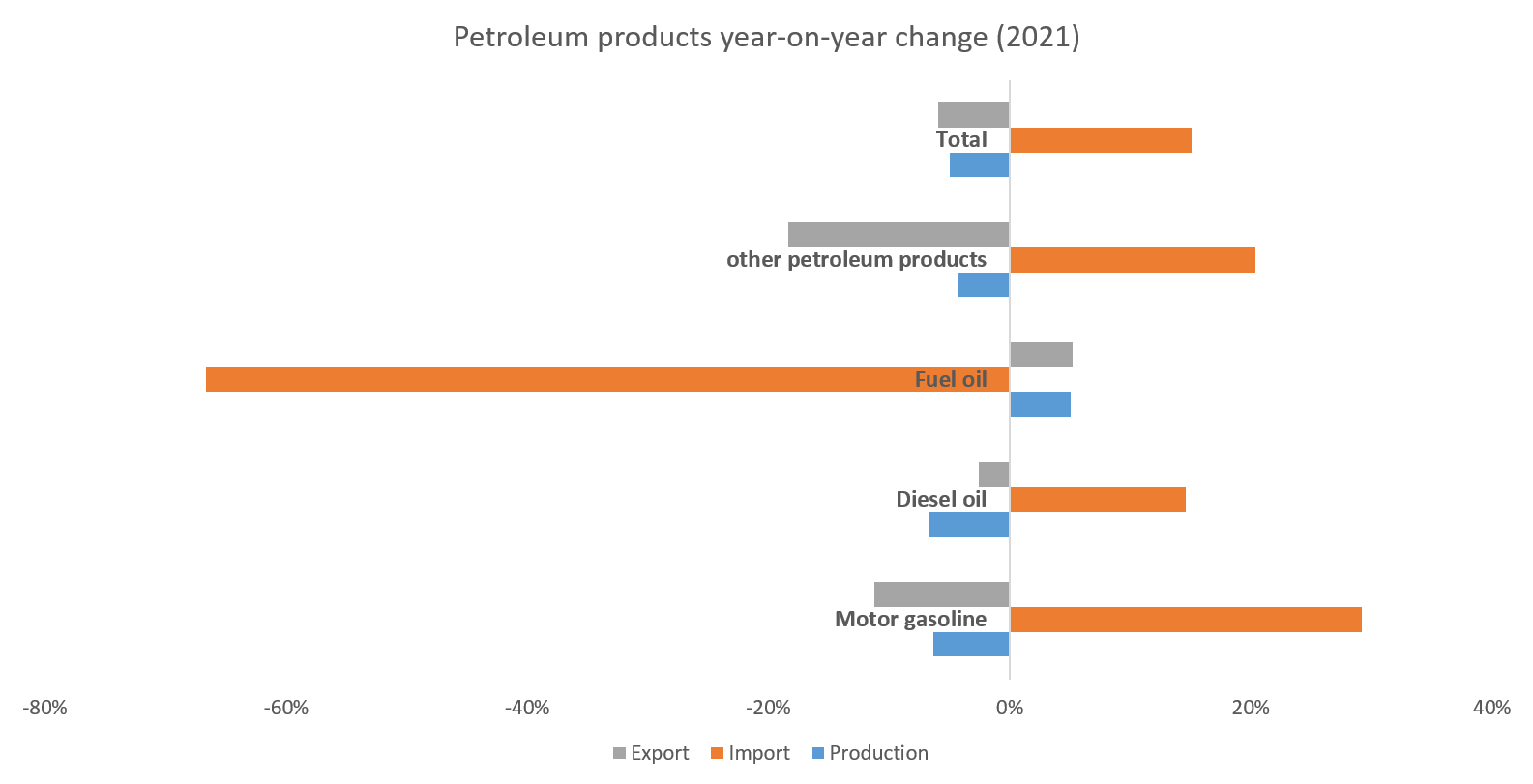
Looking at the export-import ratio we can see that Croatia is a net exporter in both motor gasoline and fuel oil with ratios of 1.875 and 21.91 in that order. On the other hand, Croatia is a net importer of Gas/Diesel oil and other petroleum products with ratios of 0.49 and 0.59. The category of petroleum products as a whole also has higher imports than exports with a ratio of 0.73.
CRUDE FUELS
Crude fuels are made of hard coal, coke, and brown coal. Croatia does not produce either of these three subcategories of crude fuels. In 2021 Croatia has imported 669 thousand tonnes of hard coal, 29 thousand tonnes of coke, and 4 thousand tonnes of brown coal. Comparing the import data with 2020, we can observe an increase of both hard coal and coke imports by 13.4% and 3.6% respectively. On the contrary brown coal, imports have decreased by 77.8%.
For more, check out our business section.
EHF EURO 2022 Qualifiers: France Tops Croatia Women's Handball in Toulouse 27-19
March 6, 2022 - France was better than the Croatia women's handball team for the second time this week, winning 27-19 in Toulouse on Sunday in the 4th round of the EHF Euro 2022 qualifiers.
The Croatia women's handball team lost to France in the 4th round match of the EHF Euro 2022 4th qualification group in Toulouse 19-27 (9-13).
Two days ago in Koprivnica, France was better than Croatia, winning 21-19, though Croatia put up a great fight. Croatia offered good resistance to the Olympic champion in the return match as well, which they played without coach Nenad Šoštarić, who is sick with an intestinal virus. Šoštarić was thus replaced on the bench by Snježana Petika.
At the end of the first half, Croatia played well, holding the 9-9 draw. France then scored four goals in a row and went into halftime with a significant advantage. In the second half, Croatia did not manage to bring the result much closer.
Dejana Milosavljević was the best for Croatia with four goals, while Kristina Prkačin, Ana Debelić, and Andrea Šimara scored three goals each. France's Grace Zaadi was the most efficient with four goals. Croatia's goalkeeper Ivana Kapitanović recorded 9 saves.
This was Croatia's 58th match in the history of European qualifiers. So far, until this match, Croatia counted 38 wins, 2 draws, and 17 defeats. France, on the other hand, had played 55 matches, with 39 wins, 4 draws, and 12 defeats. Recall, in the last two years, France has also won the Olympic gold, world, and European silver.
France leads Group 4 of the EHF EURO 2022 qualifications with a maximum of six points, Croatia has two points, as well as Ukraine, while the Czech Republic is without points. Two duels between Ukraine and the Czech Republic have been postponed due to the war in Ukraine.
The EHF EURO 2022 will be jointly organized by Slovenia, Montenegro, and North Macedonia.
To read more about sport in Croatia, follow TCN’s dedicated page.
Bright Meteor Lights Up the Night Sky Over Croatia and Italy
March 6th, 2022 - The cosmic body burned up in the atmosphere somewhere above central Italy, but it was visible from many locations in Croatia
A bright fireball lit up the night sky last night around 9 PM, drawing a lot of attention as it was visible from many locations in Croatia.
Following a number of inquiries received from citizens, the Croatian Astronomical Union put up an announcement on their Facebook page to explain the falling bolide presented no cause for concern and actually burned up in the atmosphere above Italy.
The announcement reads,
‘Given the large number of reports and queries from citizens, we wish to inform you that on March 5th 2022, around 8:55 PM, a bright fireball (bolide) was observed from numerous locations in Croatia. The cosmic body likely originated from the Asteroid belt and burned up in the atmosphere somewhere above central Italy. The fireball (bolide) lasted for about 10 seconds; observed from our parts, it was brighter than the new crescent Moon, meaning that it was probably much brighter than the full Moon when observed from the point it flew over. The Croatian and Global Meteor Networks recorded the phenomenon and we can say that the body probably weighed a few kilograms as it entered the Earth’s atmosphere, and after it’s done burning, if there is anything left of the body, it will be a few dozen grams of material from space. Further analyses, along with a search in case it is determined that a meteorite has fallen, will be carried out by our colleagues from the Italian Meteor Network, given that the event occurred in Italy.’
Here's a video showing the falling fireball:
Croatia-UAE Cooperation Becoming 'More Serious', PM Says
ZAGREB, 6 March 2022 - The cooperation between Croatia and the United Arab Emirates will soon become more intensive and more serious, Croatian Prime Minister Andrej Plenković said at a business forum between the two countries in Dubai on Sunday.
Plenković, Finance Minister Zdravko Marić, Foreign Minister Gordan Grlić Radman and Tourism Minister Nikolina Brnjac arrived at Expo 2020 on the occasion of Croatian National Day at the exhibition.
They came to Dubai with numerous Croatian business people who attended the business forum.
"I would say that this stay at Expo, such a big turnout of Croatian business people and this business forum will contribute to increasing trade, which will soon pass US$ 100 million again," the prime minister said.
After meeting with UAE leaders, he said he had a "strong confidence that the cooperation between Croatia and the UAE will take a more intensive and more serious direction."
At the forum, Plenković presented the Croatian economy to the Arab participants, saying that Croatia has a stable economic growth and the highest investment rating in its history.
For more, check out our business section.
Croatia Has Taken in Over 2,000 Ukraine Refugees, Plenković Says
ZAGREB, 6 March 2022 - Croatia has received more than 2,000 Ukrainian refugees and does not plan to stop offering assistance, Prime Minister Andrej Plenković said on Sunday.
The whole system which the government has established to receive Ukrainian refugees is "ready", he said in Dubai, where he attended the marking of Croatian National Day at Expo 2020 and visited the Ukrainian Pavilion.
"It's time we show big solidarity and we are indeed doing it," Plenković added.
Commenting on the Kremlin's claims that President Vladimir Putin has requested a list of the states which have imposed sanctions on Russia due to its invasion of Ukraine, he said Croatia stood behind its actions regarding Moscow.
"We made our decisions, we are part of the European Union and NATO, part of those countries which respect international law and order and respect other states' borders. We stand behind our decisions, independently of what the list will be like," Plenković said.
For more, check out our politics section.


